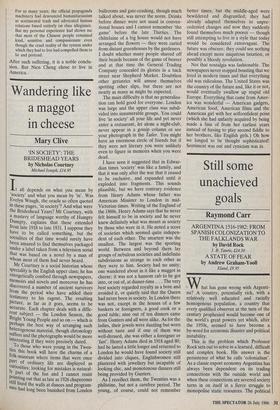Wandering like a maggot in cheese
Mary Clive
`IN SOCIETY': THE BRIDESHEAD YEARS by Nicholas Courtney
Michael Joseph, £14.95
It all all depends on what you mean by `society' and what you mean by 'in'. Was Evelyn Waugh, the oracle so often quoted in these pages, 'in society'? And what were the 13rideshead Years? Mr Courtney, with a mastery of language worthy of Humpty Dumpty, explains that these extended from late 1918 to late 1931. I suppose they have to be called something, but the socialites of that time would surely have been amazed to find themselves packaged under a label taken from a television serial that was based on a novel by a man of Whom most of them had never heard.
Mr Courtney is a social historian whose speciality is the English upper class; he has energetically combed through newspapers, memoirs and novels and moreover he has discovered a number of ancient survivors from the period who have added their testimony to his ragout. The resulting picture, as far as it goes, seems to be accurate. Each chapter deals with a diffe- rent subject — the London Season, the Bright Young People and so on — which is perhaps the best way of arranging such heterogenous material, though chronology suffers and the photographs would be more interesting if they were precisely dated. To those who were young in the Twen- ties this book will have the charms of a folk-museum where items that were once part of ordinary life are displayed as curiosities; looking for mistakes is natural- ly .part of the fun and I cannot resist Punning out that as late as 1926 chaperones still lined the walls at dances and program- mes had long been banished from London ballrooms and gate-crashing, though much talked about, was never the norm. Drinks before dinner were not usual in conven- tional houses and I cannot remember 'the game' before the late Thirties. The chatelaine of a big house would not have arranged the flowers — they were carted from distant greenhouses by the gardeners. I doubt whether many people shaved off their beards because of the game of beaver and at that time the General Trading Company concealed its glories in a back street near Shepherd Market. Doubtless other geriatrics will amuse themselves spotting other slips, but there are not nearly as many as might be expected.
The main difficulty is that no generalisa- tion can hold good for everyone. London was large and the upper class was subdi- vided into innumerable groups. You could live 'in society' all your life and yet never enter a restaurant, let alone a night-club, never appear in a gossip column or see your photograph in the Tatler. You might have an enormous circle of friends but if they were not literary you were unlikely even to figure in memoirs when you were dead.
I have seen it suggested that in Edwar- dian times 'society' was like a family, and that it was only after the war that it ceased to be exclusive, and expanded until it exploded into fragments. This sounds plausible, but we have contrary evidence from Henry Adams whose father was American Minister to London in mid- Victorian times. Writing of the England of the 1860s, Henry Adams says that he never felt himself to be in society and he never knew definitely what was meant as society by those who were in it. He noted a score of societies which seemed quite indepen- dent of each other. The smartest was the smallest. The largest was the sporting world. Between and beyond there lay groups of nebulous societies and indefinite subdivisions as strange to each other as they were to him. Society had no unity; one wandered about in it like a maggot in cheese; it was not a hansom cab to be got into, or out of, at dinner-time . . . The very best society regarded royalty as a bore and avoided it, or quietly said that the Queen had never been in society. In London there was not, except in the houses of a few bankers or foreigners, a good cook or a good table; nine out of ten dinners came from Gunters and all were alike. As for the ladies, their jewels were dazzling but worn without taste and if one of them was well-dressed, she was either a foreigner or `fast'. Henry Adams died in 1918 aged 80; had he lasted a little longer and returned to London he would have found society still divided into cliques, Englishwomen still plastered with jewellery but incapable of looking chic, and monotonous dinners still being provided by Gunters.
As I recollect them, the Twenties was a philistine, but not a carefree period. The young, of course, could not remember better times, but the middle-aged were bewildered and disgruntled; they had already adapted themselves to unpre- cedented changes and now they suddenly found themselves much poorer — though still attempting to live in a style that today would be considered extravagant. The future was obscure; they could see nothing ahead except more iniquitous taxation, or possibly a bloody revolution.
Not that nostalgia was fashionable. The newspapers never stopped boasting that we lived in modern times and that everything old was ridiculous. The United States was the country of the future and, like it or not, would eventually swallow up stupid old Europe. Everything that came from Amer- ica was wonderful — American gadgets, American food, American films and the American girl with her selfconfident poise (which she had unfairly acquired by being made a fuss of from her earliest years instead of having to play second fiddle to her brothers, like English girls.) Oh how we longed to be thought sophisticated! Sentiment was out and cynicism was in.


















































 Previous page
Previous page